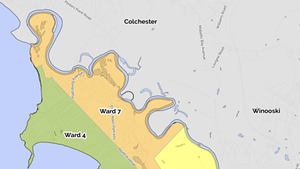
- Dreamstime
Instead of requiring developers to create a minimum amount of off-street parking, the ordinance now defines a maximum number of spaces that can be built, depending on the type of project. The measure passed on a 10-1 vote, with Councilor Joan Shannon (D-South District) voting no.
City officials said the change will encourage residential development by removing an expensive barrier to building housing projects. One parking spot can cost thousands to build, which can increase the monthly cost of a typical residential unit by as much as 30 percent, according to city estimates.
"This forward-thinking move will allow projects more flexibility to build the parking their residents or their employees actually need, as opposed to uniform minimum standards established by this council," said Councilor Ben Traverse (D-Ward 5), who chairs the council's Ordinance Committee.
"We will still have parking in the city," he added. "It's just that we'll have the parking we need."
The new ordinance also requires most developers to design a "transportation demand management" program to reduce the need for parking spaces. Options include offering residents discounted public transit passes; free car- or bike-share memberships; or courtesy shuttle service to a transit center. Developers must also track how many spots residents use for at least seven years after receiving a city certificate of occupancy, the ordinance says.
Councilor Shannon argued that the city doesn't have a real plan to reduce residents' reliance on cars. She said the transportation demand management program was "watered down to appease developers" and worries that lower-income residents and tenants will struggle to find parking.
Mayor Miro Weinberger, who first proposed eliminating parking minimums about eight years ago, acknowledged the ordinance could "create greater parking challenges in certain parts of the city" over time. But he said the city, households and businesses can address those issues with the existing residential parking program, which issues permits for street parking, and with a more robust transportation demand management program.
"We will be looking more broadly at how we actually create new transportation systems that actually serve the people of Burlington and also allow much-needed new housing to get built," he said.
Related Scott Signs Burlington Thermal Energy Bill into Law

Scott Signs Burlington Thermal Energy Bill into Law
News
Starting in 2024, the fees would apply to new construction or existing commercial and industrial buildings greater than 50,000 square feet that install new fossil fuel heating systems. The fees would apply to water heating systems in residential buildings of four or more units in 2026. All other buildings, such as existing single-family homes, would be exempt.
The fee would be as high as $150 per ton of estimated carbon emissions created by the building's heating system over its lifetime, and would increase with inflation each year up to 5 percent. The revenue could be used to expand the city's electric vehicle fleet or to install clean heating systems for renters and low-income households, among other programs.
Voters in 2021 adopted a charter change that gave the city the ability to regulate thermal heating systems with a carbon fee. The change, which Gov. Phil Scott signed into law in April, requires voters to approve the fee via a separate ballot item.
Councilors on Monday also unanimously approved a resolution thanking the Burlington Police Department for its work solving recent gun crimes.
Related Burlington Police Form Gun Violence Task Force with Feds, Local Agencies

Burlington Police Form Gun Violence Task Force with Feds, Local Agencies
News
Burlington has tallied 52 gunfire incidents since 2020 compared to an average of two per year between 2012 and 2019. The gun violence has had an outsize impact on young men of color, including those from immigrant communities.
Councilor Ali Dieng (I-Ward 7) said detectives have done diligent work but expressed unease about the resolution, noting that the city can do more to prevent further gun violence among people of color.
Correction, January 10, 2023: A previous version of this story inaccurately described the carbon fee amount and which properties would be subject to it.













Comments
Comments are closed.
From 2014-2020, Seven Days allowed readers to comment on all stories posted on our website. While we've appreciated the suggestions and insights, right now Seven Days is prioritizing our core mission — producing high-quality, responsible local journalism — over moderating online debates between readers.
To criticize, correct or praise our reporting, please send us a letter to the editor or send us a tip. We’ll check it out and report the results.
Online comments may return when we have better tech tools for managing them. Thanks for reading.